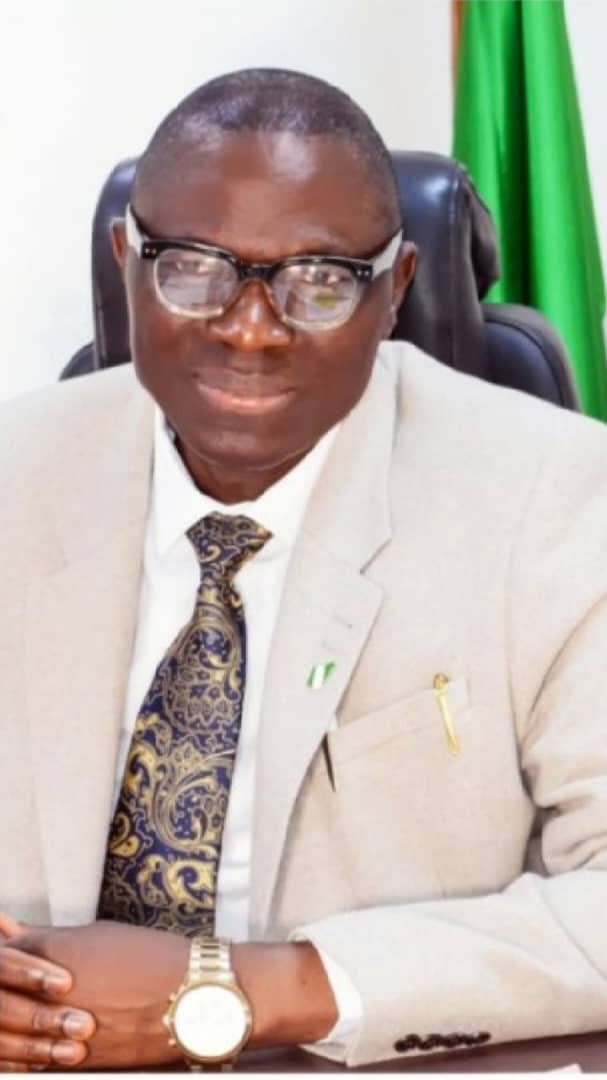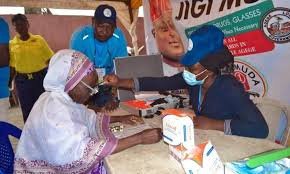
Medical Director, Federal Neuro-Psychiatric Hospital, Yaba, Dr. Olugbenga Owoeye
LAGOS, Nigeria – Nigeria faces a mental health crisis, with an estimated 40–60 million people affected. At the forefront of this challenge is the Federal Neuro-Psychiatric Hospital, Yaba, Lagos, established in 1907 and now led by Dr. Olugbenga Owoeye. A Chief Consultant Psychiatrist and Clinical Psychologist with over 22 years of service, Dr. Owoeye has held multiple leadership roles, authored more than 30 publications, and is widely recognised for advancing mental health care in Nigeria. Since assuming office as Medical Director in 2021, he has prioritised infrastructure renewal, patient-centred reforms, and community outreach.
In this exclusive conversation with Korede Abdullah, Africa Health Report Southwest Correspondent, Dr. Owoeye speaks about the burden of mental illness in Nigeria, the transformation of Yaba under his leadership, and the urgent need for greater national investment in mental health.
What is your assessment of the mental health situation in Nigeria, and how does Yaba Hospital respond to this challenge?
Mental health is a major challenge in Nigeria, with estimates ranging from 40 to over 60 million people affected. While figures vary, a 2004 WHO study showing one in eight Nigerians had a mental illness may be the most reliable.
In this context, the Federal Neuro-Psychiatric Hospital, Yaba, plays a vital role. With 535 beds and services covering general, child and adolescent, forensic, geriatric, and community psychiatry, we serve Lagos and receive referrals nationwide, making us central to the country’s mental health response.
Nigeria’s health budget allocates less than 5% to mental health. How does this underfund affect care delivery?
Nigeria is not investing enough in mental health compared to other health priorities such as maternal care and infectious diseases. Despite affecting millions, less than 5% of the health budget goes to mental health, leading to poor infrastructure, few facilities, and a shortage of professionals. If Nigeria is to make progress, mental health must be fully integrated into the healthcare system with a fairer allocation of resources.
The Mental Health Act became law in 2023. What impact has it had so far?
I see the passage of the Mental Health Act in 2023 as a landmark development. It provides a strong legal framework that protects the rights and dignity of people with mental health conditions, something long overdue in Nigeria.
For us as a hospital, it has reinforced patient-centered care by ensuring that treatment is guided not only by clinical standards but also by human rights principles. It strengthens accountability, improves access to services, and compels us to adopt best practices in line with global standards. Ultimately, I will add that the Act empowers patients, reduces stigma, and gives us the institutional backing to deliver care in a way that respects their autonomy and well-being.
Could you highlight the core services offered at Yaba?
The Federal Neuro-Psychiatric Hospital, Yaba is one of the oldest and most reputable psychiatric institutions in Africa.
Beyond psychiatry, we provide general medical care, emergency services, psychotherapy, addiction treatment, occupational therapy, reintegration programmes, radiology and laboratory services, and pharmacy support. We also run training and research programmes, with patients coming from across Nigeria and neighbouring West African countries.
Since you assumed office in 2021, what reforms have you prioritised?
My vision was to improve both service quality and infrastructure. Outpatient waiting times have been reduced from four hours in 2020 to two hours by 2024.
We introduced ICU services, revived long-abandoned projects, and doubled internally generated revenue through ICT-driven systems. These reforms have improved patient experience and boosted confidence in psychiatric care.
What major infrastructural projects have been completed under your leadership?
We constructed a 10-bed ICU and isolation centre, a Telepsychiatry Centre, and a 100-bed hostel for nursing students.
We completed the Resident Doctors’ Quarters, remodelled outpatient clinics, renovated key wards, procured ambulances, and installed solar power across critical units. Currently, a new Telepsychiatry complex, a CBT centre, and the College of Nursing Sciences are under construction.
You also invested in aesthetics. Why was that important?
Healing is shaped by the environment. For over 20 years, the hospital had not been repainted, and the ambience was depressing. By refurbishing and repainting key areas, we created a therapeutic, dignified, and welcoming atmosphere. Patients, staff, and visitors now feel more comfortable and respected.
Staff welfare often fuels disputes in public hospitals. How have you approached it?
Staff welfare is non-negotiable. We cleared promotion arrears, paid allowances, improved office spaces, and strengthened relations with unions. We have also prioritised recruitment, training, and career progression. A motivated workforce is the engine behind all our achievements.
What role does Yaba play in education and research?
Education and training are integral to our mission. About 18 nursing schools and several tertiary medical institutions are affiliated with us. We recently secured approval for the College of Nursing Sciences, with new facilities under construction.
We increased admission capacity for post-basic psychiatry nursing from 30 to 75 students, and for the School of Occupational Therapy from 50 to 80 students. We also host annual research conferences every October where new findings are showcased.
In the last three years, we have produced eight consultant psychiatrists, six of whom remain with the hospital.
How affordable are your services compared with private facilities?
Our services are heavily subsidised by the federal government, making them far more affordable than private options.
What distinguishes this hospital from other psychiatric institutions in Nigeria?
Our strength lies in our people and our training institutions. With a workforce of 842, including 62 resident doctors, 21 consultant psychiatrists, and 287 nurses, our staff are our greatest asset.
Their professionalism and dedication earned us recognition as one of the top-performing hospitals in Nigeria by the National Postgraduate Medical College of Nigeria.
We also run a renowned residency training program and a School of Occupational Therapy whose graduates are often first-choice candidates for employers globally. Many of our alumni now practice in reputable facilities overseas.
The hospital’s internally generated revenue nearly doubled between 2020 and 2024. What were the key strategies behind this financial turnaround?
The growth was the result of pragmatic, goal-oriented leadership. We curbed wastage, improved efficiency, and expanded our service lines. For example, we purchased a digital X-ray machine, introduced more general medical services, and created new revenue streams that attracted more patients. By 2020 alone, our 25% remittance to the government was higher than what the hospital had contributed in over 45 years.
Between 2020 and 2024, revenue rose from ₦753.9 million to ₦1.49 billion, and this consistency reflects not just financial growth but improved patient trust in our services.
We ensure that even average Nigerians can access quality psychiatric and general medical care.
What message would you share with Nigerians reluctant to seek professional support?
Mental health conditions are treatable. Seeking help is not weakness, it is courage. The earlier one seeks care, the better the chances of recovery and living a fuller, healthier life.
How can the media reshape perceptions of mental health?
The media is critical. By sharing accurate information, telling recovery stories, and reducing stigma, the media can normalise conversations about mental health and encourage more Nigerians to seek timely care.



